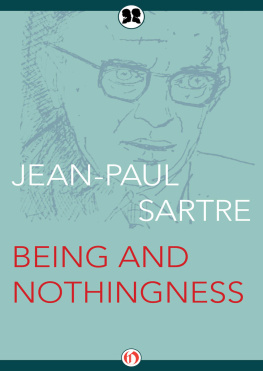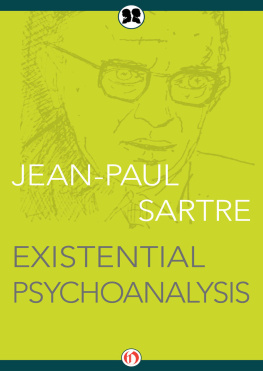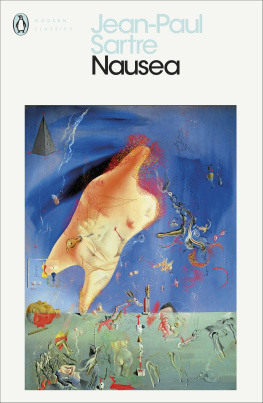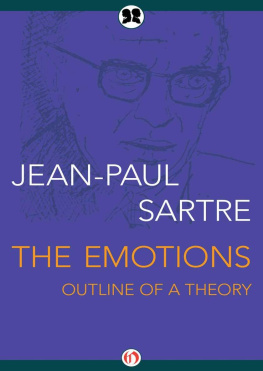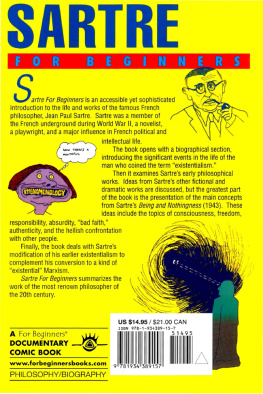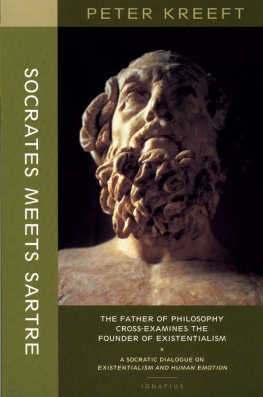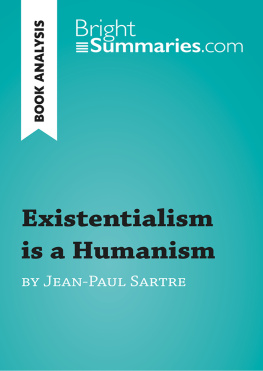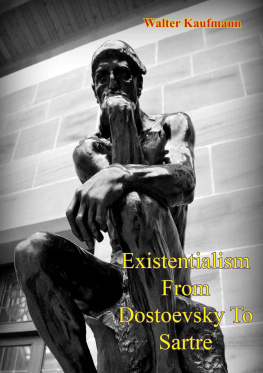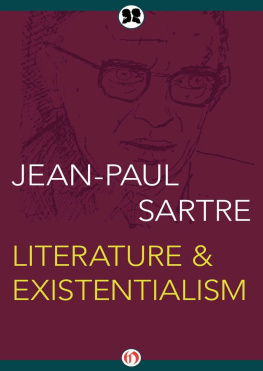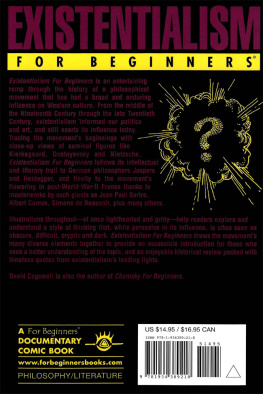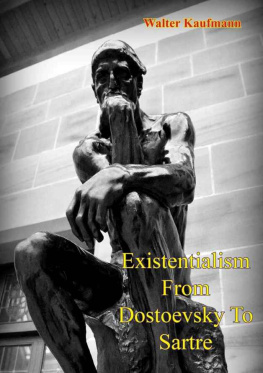Jean-Paul Sartre 1946
Existentialism Is a Humanism
Written: Lecture given in 1946
Source: Existentialism from Dostoyevsky to Sartre, ed. Walter Kaufman, Meridian Publishing Company, 1989;
First Published: World Publishing Company in 1956;
Translator: Philip Mairet;
Copyright: reproduced under the Fair Use provisions;
HTML Markup: by Andy Blunden 1998; proofed and corrected February 2005.
My purpose here is to offer a defence of existentialism against several reproaches that have been laid against it.
First, it has been reproached as an invitation to people to dwell in quietism of despair. For if every way to a solution is barred, one would have to regard any action in this world as entirely ineffective, and one would arrive finally at a contemplative philosophy. Moreover, since contemplation is a luxury, this would be only another bourgeois philosophy. This is, especially, the reproach made by the Communists.
From another quarter we are reproached for having underlined all that is ignominious in the human situation, for depicting what is mean, sordid or base to the neglect of certain things that possess charm and beauty and belong to the brighter side of human nature: for example, according to the Catholic critic, Mlle. Mercier, we forget how an infant smiles. Both from this side and from the other we are also reproached for leaving out of account the solidarity of mankind and considering man in isolation. And this, say the Communists, is because we base our doctrine upon pure subjectivity upon the Cartesian I think: which is the moment in which solitary man attains to himself; a position from which it is impossible to regain solidarity with other men who exist outside of the self. The ego cannot reach them through the cogito.
From the Christian side, we are reproached as people who deny the reality and seriousness of human affairs. For since we ignore the commandments of God and all values prescribed as eternal, nothing remains but what is strictly voluntary. Everyone can do what he likes, and will be incapable, from such a point of view, of condemning either the point of view or the action of anyone else.
It is to these various reproaches that I shall endeavour to reply today; that is why I have entitled this brief exposition Existentialism is a Humanism. Many may be surprised at the mention of humanism in this connection, but we shall try to see in what sense we understand it. In any case, we can begin by saying that existentialism, in our sense of the word, is a doctrine that does render human life possible; a doctrine, also, which affirms that every truth and every action imply both an environment and a human subjectivity. The essential charge laid against us is, of course, that of over-emphasis upon the evil side of human life. I have lately been told of a lady who, whenever she lets slip a vulgar expression in a moment of nervousness, excuses herself by exclaiming, I believe I am becoming an existentialist. So it appears that ugliness is being identified with existentialism. That is why some people say we are naturalistic, and if we are, it is strange to see how much we scandalise and horrify them, for no one seems to be much frightened or humiliated nowadays by what is properly called naturalism. Those who can quite well keep down a novel by Zola such as La Terre are sickened as soon as they read an existentialist novel. Those who appeal to the wisdom of the people which is a sad wisdom find ours sadder still. And yet, what could be more disillusioned than such sayings as Charity begins at home or Promote a rogue and hell sue you for damage, knock him down and hell do you homage? We all know how many common sayings can be quoted to this effect, and they all mean much the same that you must not oppose the powers that be; that you must not fight against superior force; must not meddle in matters that are above your station. Or that any action not in accordance with some tradition is mere romanticism; or that any undertaking which has not the support of proven experience is foredoomed to frustration; and that since experience has shown men to be invariably inclined to evil, there must be firm rules to restrain them, otherwise we shall have anarchy. It is, however, the people who are forever mouthing these dismal proverbs and, whenever they are told of some more or less repulsive action, say How like human nature! it is these very people, always harping upon realism, who complain that existentialism is too gloomy a view of things. Indeed their excessive protests make me suspect that what is annoying them is not so much our pessimism, but, much more likely, our optimism. For at bottom, what is alarming in the doctrine that I am about to try to explain to you is is it not? that it confronts man with a possibility of choice. To verify this, let us review the whole question upon the strictly philosophic level. What, then, is this that we call existentialism?
Most of those who are making use of this word would be highly confused if required to explain its meaning. For since it has become fashionable, people cheerfully declare that this musician or that painter is existentialist. A columnist in Clartes signs himself The Existentialist, and, indeed, the word is now so loosely applied to so many things that it no longer means anything at all. It would appear that, for the lack of any novel doctrine such as that of surrealism, all those who are eager to join in the latest scandal or movement now seize upon this philosophy in which, however, they can find nothing to their purpose. For in truth this is of all teachings the least scandalous and the most austere: it is intended strictly for technicians and philosophers. All the same, it can easily be defined.
The question is only complicated because there are two kinds of existentialists. There are, on the one hand, the Christians, amongst whom I shall name Jaspers and Gabriel Marcel, both professed Catholics; and on the other the existential atheists, amongst whom we must place Heidegger as well as the French existentialists and myself. What they have in common is simply the fact that they believe that existence comes before essence or, if you will, that we must begin from the subjective. What exactly do we mean by that?
If one considers an article of manufacture as, for example, a book or a paper-knife one sees that it has been made by an artisan who had a conception of it; and he has paid attention, equally, to the conception of a paper-knife and to the pre-existent technique of production which is a part of that conception and is, at bottom, a formula. Thus the paper-knife is at the same time an article producible in a certain manner and one which, on the other hand, serves a definite purpose, for one cannot suppose that a man would produce a paper-knife without knowing what it was for. Let us say, then, of the paperknife that its essence that is to say the sum of the formulae and the qualities which made its production and its definition possible precedes its existence. The presence of such-and-such a paper-knife or book is thus determined before my eyes. Here, then, we are viewing the world from a technical standpoint, and we can say that production precedes existence.
When we think of God as the creator, we are thinking of him, most of the time, as a supernal artisan. Whatever doctrine we may be considering, whether it be a doctrine like that of Descartes, or of Leibnitz himself, we always imply that the will follows, more or less, from the understanding or at least accompanies it, so that when God creates he knows precisely what he is creating. Thus, the conception of man in the mind of God is comparable to that of the paper-knife in the mind of the artisan: God makes man according to a procedure and a conception, exactly as the artisan manufactures a paper-knife, following a definition and a formula. Thus each individual man is the realisation of a certain conception which dwells in the divine understanding. In the philosophic atheism of the eighteenth century, the notion of God is suppressed, but not, for all that, the idea that essence is prior to existence; something of that idea we still find everywhere, in Diderot, in Voltaire and even in Kant. Man possesses a human nature; that human nature, which is the conception of human being, is found in every man; which means that each man is a particular example of a universal conception, the conception of Man. In Kant, this universality goes so far that the wild man of the woods, man in the state of nature and the bourgeois are all contained in the same definition and have the same fundamental qualities. Here again, the essence of man precedes that historic existence which we confront in experience.
Next page

